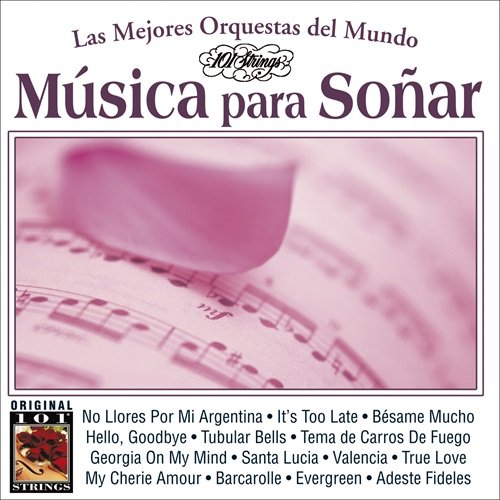Tages - Tages, 1964-68! (1992)
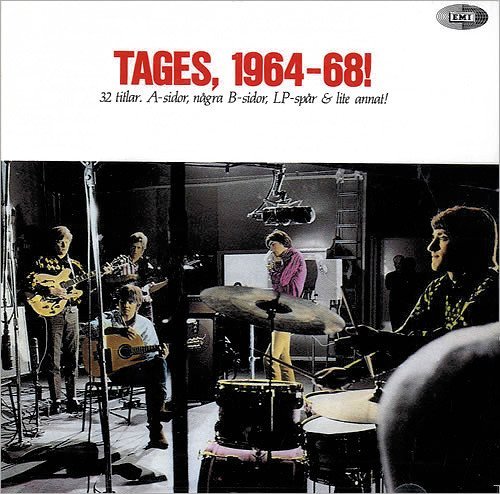
Artist: Tages
Title: Tages, 1964-68!
Year Of Release: 1992
Label: EMI
Genre: Psychedelic Rock, Psychedelic Pop
Quality: Flac (tracks, .cue, log)
Total Time: 01:17:32
Total Size: 522 Mb (scans)
WebSite: Album Preview
Title: Tages, 1964-68!
Year Of Release: 1992
Label: EMI
Genre: Psychedelic Rock, Psychedelic Pop
Quality: Flac (tracks, .cue, log)
Total Time: 01:17:32
Total Size: 522 Mb (scans)
WebSite: Album Preview
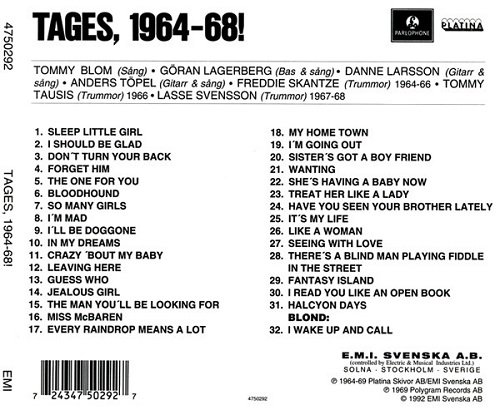
Tracklist:
01. Sleep Little Girl
02. I Should Be Glad
03. Don't Turn Your Back
04. Forget Him
05. The One for You
06. Bloodhound
07. So Many Girls
08. I'm Mad
09. I'll Be Doggone
10. In My Dreams
11. Crazy 'Bout My Baby
12. Leaving Here
13. Guess Who
14. Jealous Girl
15. The Man You'll Be Looking for
16. Miss McBaren
17. Every Raindrop Means a Lot
18. My Home Town
19. I'm Going Out
20. Sister's Got a Boy Friend
21. Wanting
22. She's Having a Baby Now
23. Treat Her Like a Lady
24. Have You Seen Your Brother Lately
25. It's My Life
26. Like a Woman
27. Seeing with Love
28. There's a Blind Man Playing Fiddle in the Street
29. Fantasy Island
30. I Read You Like an Open Book
31. Halcyon Days
32. I Wake Up and Call (as Blond)
Line-up:
Bass, Vocals – Göran Lagerberg
Drums – Freddie Skantze, Lasse Svensson, Tommy Tausis
Guitar, Vocals – Anders Töpel, Danne Larsson
Vocals – Tommy Blom
In the early 60s, skiffle was not only a big craze in England, it hit Sweden pretty hard too. In a small town outside of Gothenburg, a 16-year old lad named Tommy Blom had just received a guitar from his parents. One day he met an old school chum, Anders Töpel, who also had a guitar, and who in turn knew a third guitar player, Danne Larsson. These three young boys started playing together, and soon a fourth member was added, Göran Lagerberg. On purpose they chose the "geeky" name Tages (from Danne's middle name) to make fun of all guitar based pop bands with their slick attitude and suits.
Soon, however, the four youths decided to change their style, after having been introduced to the new "Mersey" sound. A drummer, Freddie Skantze, was added, and within a short time a reshuffle of the instruments followed. Lagerberg took up the bass, while Danne and Anders were to play rhythm and lead guitar respectively. This left Tommy as lead singer and tambourine player.
Their first gig was held on 23 December 1963. Their name was becoming locally known and in August 1964, a Swedish newspaper held a contest called "The Beatles of the West Coast". Many different groups applied, but finally Tages were the victors, earning the right to make a record for the new company Platina. This first recording session took place on 20 September 1964. While the studio was pretty basic, Tages did bring two good songs to the sessions, Sleep little girl and Tell me you’re mine, which were released as a single about a month later. One day, not knowing that the single was going to be tested for the Swedish Top Ten, the boys heard themselves on the radio, and just one week later, the single had reached no. 1, replacing none other than the Beatles.
A couple of months later, the next single followed: I should be glad b/w I cry. This was not only a commercial success, but the critics liked it too, and now Tages were accepted by the large crowd. On 31 March 1965, Tages got to open for the Rolling Stones on their performance in Gothenburg. New singles followed, and the first eponymous LP was released in November. At about the same time, Göran and Freddie were allowed to play together with Chuck Berry in Stockholm.
Göran and Freddie together with Chuck Berry
The first single after the LP was a change of direction. Their music had previously been rather similar to that of the Beatles and other beat groups, but just like the Beatles, Tages felt the need for change. So for the next single, So many girls, a new instrument was added, the recorder. A more soft sound was the result, and the single was a great success. Therefore, Tages and their management decided that it was time to break the English market. Very thorough preparations followed, new clothes, new equipment, etc. Unfortunately, what the management had forgotten was that work permits would be necessary for Tages to be allowed to play in Britain. The boys had to turn back to Sweden, beginning work on their second LP, simply to be called "2".
Another setback was the resignation of original drummer, Freddie Skantze. A replacement was soon found in Tommy Tausis, who had been playing with another important Swedish pop group, the Strangers, until their break-up. Tausis is also present on some tracks on the second LP, which was released in July 1966.
Musical experiments became increasingly important to the boys, who were very eclectic in their choice of music, playing many original songs, as well as some carefully chosen covers. The next LP, "Extra Extra", was released towards the end of 1966, and, like its predecessor, consisted of 6 original songs and 6 covers. Covers were taken from many different styles of music: soul, pop, and Motown. On "Extra Extra", there were a number of interesting original songs, showing the band’s willingness to experiment. One song, Extra, featured a theremin, just like Good vibrations by the Beach Boys. Other songs had controversial lyrics, like Secret room. This was also their last release at Platina, since they had signed a contract with the Swedish branch of Parlophone.
Tommy Tausis had never really settled in the group and after the release of the third LP, he resigned. The next drummer in Tages was Lasse Svensson, and the first release he was featured on was a revelation: the single Every raindrop means a lot. Finally, psychedelia had reached Sweden. Nonsensical lyrics were combined with a strange musical arrangement, and hey presto, a new change in direction had been made. Together with their producer, Anders Henriksson, Tages now began producing incredibly clever and interesting music, as can be heard on the two 1967 LPs, "Contrast" and "Studio". Contrast only has four covers (plus one especially written for them by producer Henriksson and Thorstein Bergman). Criticism of society, love songs, psychedelia, everything can be found on this LP.
Soon, however, the four youths decided to change their style, after having been introduced to the new "Mersey" sound. A drummer, Freddie Skantze, was added, and within a short time a reshuffle of the instruments followed. Lagerberg took up the bass, while Danne and Anders were to play rhythm and lead guitar respectively. This left Tommy as lead singer and tambourine player.
Their first gig was held on 23 December 1963. Their name was becoming locally known and in August 1964, a Swedish newspaper held a contest called "The Beatles of the West Coast". Many different groups applied, but finally Tages were the victors, earning the right to make a record for the new company Platina. This first recording session took place on 20 September 1964. While the studio was pretty basic, Tages did bring two good songs to the sessions, Sleep little girl and Tell me you’re mine, which were released as a single about a month later. One day, not knowing that the single was going to be tested for the Swedish Top Ten, the boys heard themselves on the radio, and just one week later, the single had reached no. 1, replacing none other than the Beatles.
A couple of months later, the next single followed: I should be glad b/w I cry. This was not only a commercial success, but the critics liked it too, and now Tages were accepted by the large crowd. On 31 March 1965, Tages got to open for the Rolling Stones on their performance in Gothenburg. New singles followed, and the first eponymous LP was released in November. At about the same time, Göran and Freddie were allowed to play together with Chuck Berry in Stockholm.
Göran and Freddie together with Chuck Berry
The first single after the LP was a change of direction. Their music had previously been rather similar to that of the Beatles and other beat groups, but just like the Beatles, Tages felt the need for change. So for the next single, So many girls, a new instrument was added, the recorder. A more soft sound was the result, and the single was a great success. Therefore, Tages and their management decided that it was time to break the English market. Very thorough preparations followed, new clothes, new equipment, etc. Unfortunately, what the management had forgotten was that work permits would be necessary for Tages to be allowed to play in Britain. The boys had to turn back to Sweden, beginning work on their second LP, simply to be called "2".
Another setback was the resignation of original drummer, Freddie Skantze. A replacement was soon found in Tommy Tausis, who had been playing with another important Swedish pop group, the Strangers, until their break-up. Tausis is also present on some tracks on the second LP, which was released in July 1966.
Musical experiments became increasingly important to the boys, who were very eclectic in their choice of music, playing many original songs, as well as some carefully chosen covers. The next LP, "Extra Extra", was released towards the end of 1966, and, like its predecessor, consisted of 6 original songs and 6 covers. Covers were taken from many different styles of music: soul, pop, and Motown. On "Extra Extra", there were a number of interesting original songs, showing the band’s willingness to experiment. One song, Extra, featured a theremin, just like Good vibrations by the Beach Boys. Other songs had controversial lyrics, like Secret room. This was also their last release at Platina, since they had signed a contract with the Swedish branch of Parlophone.
Tommy Tausis had never really settled in the group and after the release of the third LP, he resigned. The next drummer in Tages was Lasse Svensson, and the first release he was featured on was a revelation: the single Every raindrop means a lot. Finally, psychedelia had reached Sweden. Nonsensical lyrics were combined with a strange musical arrangement, and hey presto, a new change in direction had been made. Together with their producer, Anders Henriksson, Tages now began producing incredibly clever and interesting music, as can be heard on the two 1967 LPs, "Contrast" and "Studio". Contrast only has four covers (plus one especially written for them by producer Henriksson and Thorstein Bergman). Criticism of society, love songs, psychedelia, everything can be found on this LP.
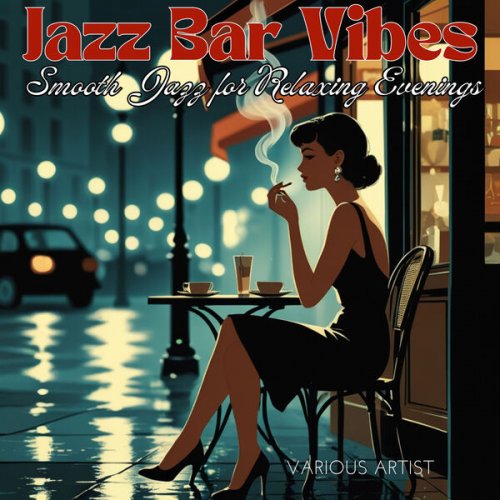
![Claude Williamson - Round Midnight (Remastered 2014) (2026) [Hi-Res] Claude Williamson - Round Midnight (Remastered 2014) (2026) [Hi-Res]](https://www.dibpic.com/uploads/posts/2026-02/1770854964_cover.jpg)
![Trio Brūme - Baignade interdite (2026) [Hi-Res] Trio Brūme - Baignade interdite (2026) [Hi-Res]](https://www.dibpic.com/uploads/posts/2026-02/1770989318_a2262940476_10.jpg)
![Ella Fitzgerald, Louis Armstrong - The Complete Ella And Louis On Verve [3CD] (1997) Ella Fitzgerald, Louis Armstrong - The Complete Ella And Louis On Verve [3CD] (1997)](https://www.dibpic.com/uploads/posts/2026-02/1770703124_600.jpg)
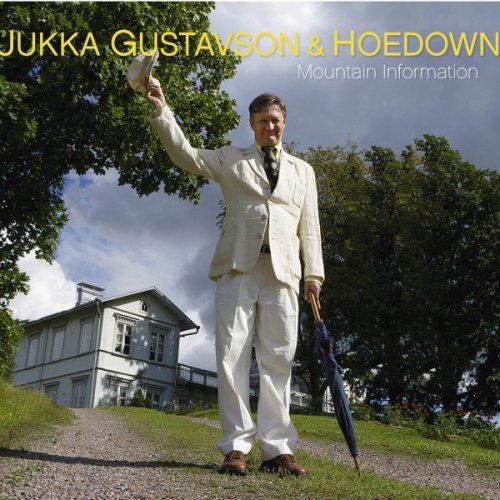
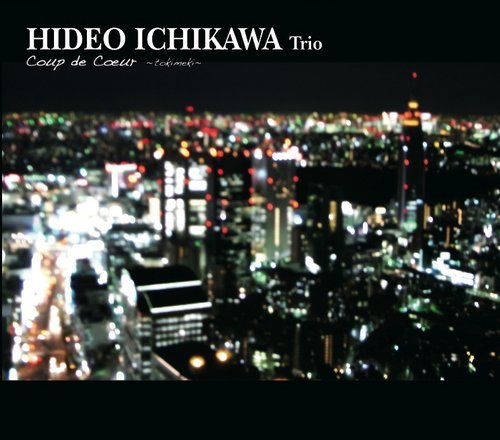
![Lawson Rollins - Next Steps (2026) [Hi-Res] Lawson Rollins - Next Steps (2026) [Hi-Res]](https://www.dibpic.com/uploads/posts/2026-02/1770816912_hjwdsle59zzz6_600.jpg)
